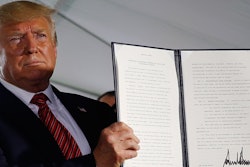MINNEAPOLIS (AP) — Cargill Inc. said Thursday the Minnesota-based agribusiness giant will spend $30 million to fund new ideas for ending deforestation in Brazil, and called on its peers, governments and organizations to work together to come up with real solutions.
Minnetonka-based Cargill is a major player in Brazilian soy production, which has impacted ecosystems in Brazil. Cargill said the industry is poised to fall short of its goal to eliminate deforestation in key supply chains, including soy, by 2020.
Ruth Kimmelshue, Cargill's head of supply chain and chief sustainability officer, told the Star Tribune that the climate is changing and there's an urgent need to take action.
But Kimmelshue said Cargill, its peers and international organizations will fall short of reaching their goals.
"I'm not going to admit defeat, but we can all be reasonable people and see that we have significantly more work to do," Kimmelshue said Thursday.
In Brazil, soybean farming continues to encroach on ecosystems in the South American country, leading to destruction of forests and native vegetations. Soy often is a base ingredient in livestock feed, and a growing appetite for meat around the world is pushing demand for the crop and prompting many South American farmers to expand their cropland.
Brazil is the second-largest producer of soybeans in the world, with 59 million to 62 million acres dedicated to the crop, according to the Yale School of Forestry & Environmental Studies Global Forest Atlas.
Cargill and its industry peers agreed more than a decade ago to a purchase moratorium on soybeans grown on newly deforested land in the Amazon. In 2014, Cargill signed the United Nations' New York Declaration on Forests, a global pledge to end and reverse the loss of forests.
Cargill has taken steps to end deforestation, but says the issue is complex. Environmental groups say businesses like Cargill are unwilling to take true leadership on the issue and must do more.
Glenn Hurowitz, chief executive of Mighty Earth, said Cargill's plan "purposefully lacks a commitment to stop buying from producers who contribute to deforestation."
"Cargill is fiddling while South America burns," Hurowitz said. He said he is disappointed the company stopped short of implementing a soy moratorium against "rogue actors" in the Cerrado and Gran Chaco regions of Brazil.
"Soy moratoriums are hugely effective. It worked in the Amazon," Hurowitz said. "We and every other environmental group has been urging them to implement such a requirement for the last five years."
Cargill believes others would continue to buy crops grown on deforested land if the company left the region, Kimmelshue said.
"Exiting high-risk areas will not solve the problem. It simply will move it," Kimmelshue said. "We are hoping that we will rally the industry."





















